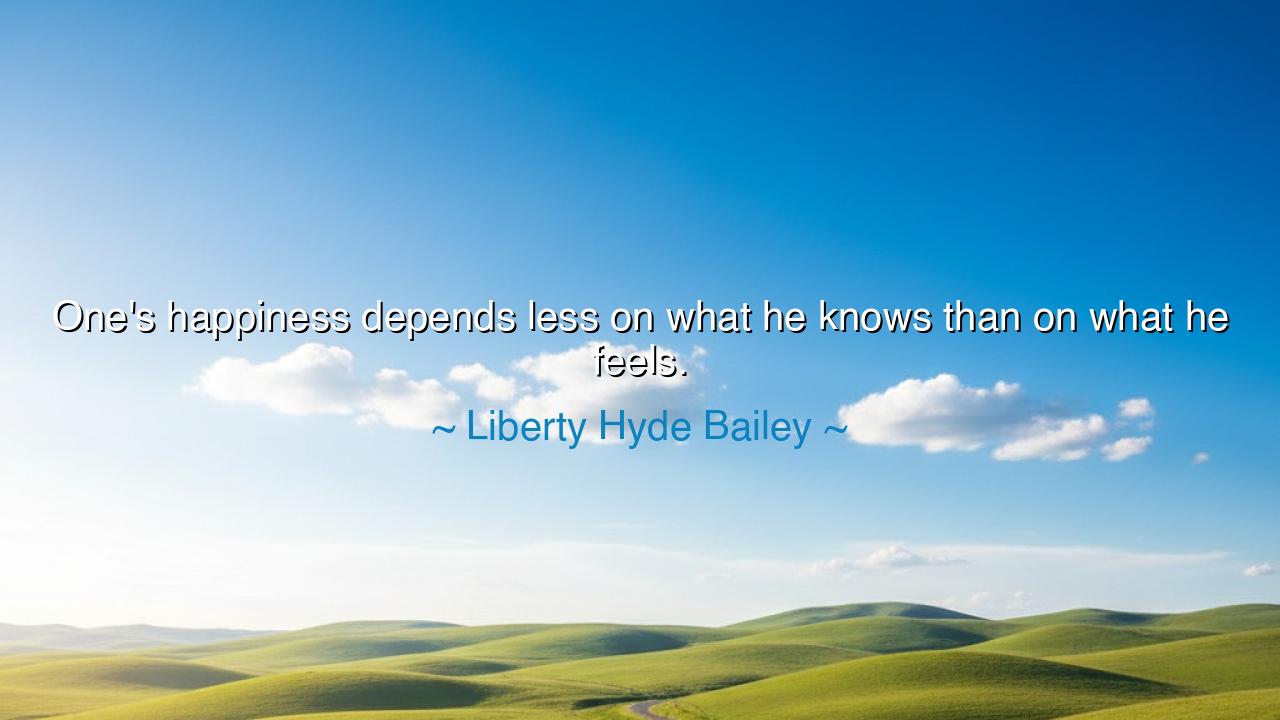
One's happiness depends less on what he knows than on what he






"One's happiness depends less on what he knows than on what he feels." These words of Liberty Hyde Bailey, the great American horticulturist and philosopher of the earth, speak not only of the soil and its seasons but of the very garden of the human soul. For knowledge, though radiant like the morning sun, can never warm the heart that is cold within. It can show a man the path through the forest, but it cannot make his feet move nor his heart rejoice at the singing of the birds. The ancients knew this truth well — that wisdom without feeling is like a tree with roots in stone: tall, perhaps, but fruitless, and doomed to wither in time.
In the world of men, many chase after knowledge as if it were the summit of all virtue. They fill their minds with facts and theories, yet their hearts remain empty, untouched by wonder or compassion. Such men may be great in learning but poor in spirit. What use is it to know the stars by name if one cannot feel their quiet beauty? What profit is there in studying the laws of life if one’s heart does not throb with the joy of being alive? The mind is the lamp, but the heart is the flame; without the fire, there is no light.
There once lived a philosopher in ancient Greece — Diogenes, the man who carried his lamp through the streets of Athens, searching for an honest soul. He mocked kings and scholars alike, for he saw that wisdom without virtue, and knowledge without feeling, were hollow things. When Alexander the Great came to him and asked if there was anything he desired, Diogenes simply replied, “Stand out of my sunlight.” In that moment, he taught the greatest conqueror of the world that contentment and happiness come not from dominion or knowledge, but from the freedom of the heart — the peace of one who feels deeply and desires little.
Happiness, then, is not a crown bestowed upon the learned; it is a fire born of feeling — of gratitude, of love, of connection to life. The peasant who toils beneath the sun, humming as he plants his seed, may feel more joy than the scholar who dissects the world in silence. For feeling ties the soul to life itself, while knowledge can only observe it from afar. The heart is the bridge, the living bond between the human and the divine, and without it, all understanding turns to dust.
Even in our modern age, where machines hum and numbers rule, the lesson remains unchanged. Consider the story of Helen Keller, who was blind and deaf, yet found in the warmth of human touch and the fragrance of a rose more happiness than many who see and hear. Her teacher, Anne Sullivan, gave her not only knowledge but feeling — the sense of wonder, love, and belonging that made her spirit bloom. From this we learn that the greatest education is that of the heart; to feel is to live, and to live fully is to be happy.
Therefore, my children, let your knowledge serve your feeling, not the other way around. Study not only to know, but to understand, to empathize, to rejoice. Let the books you read open not just your mind but your soul. When you walk among others, listen not only to their words but to the tremor of their hearts. When you gaze upon the world, see not only its shapes and forms but its spirit. For in feeling, there lies the secret music of existence, the pulse of joy that makes knowledge alive.
Remember this teaching: Happiness is not found in what the mind holds, but in what the heart embraces. Cultivate your heart as you would a sacred garden — water it with kindness, feed it with gratitude, let the sunlight of love fall upon it each day. Speak gently, act with compassion, and seek beauty in the ordinary. In doing so, you shall find what all the sages sought — not the knowledge of life, but the feeling of being truly alive.






AAdministratorAdministrator
Welcome, honored guests. Please leave a comment, we will respond soon